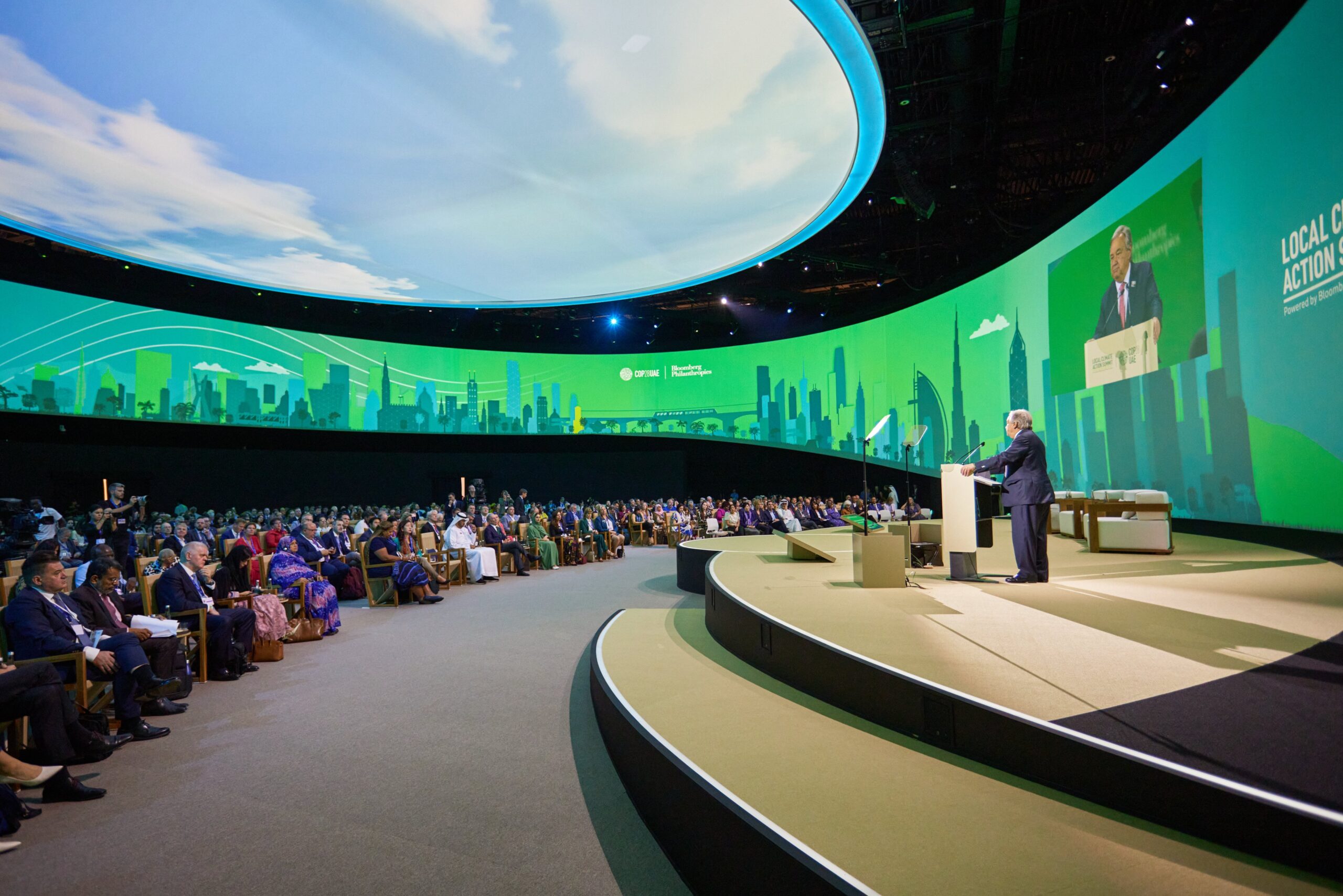For years cities and subnational governments have struggled to be recognized as a key player in the climate change agenda. Finally, at COP 28, the significance of their role has been acknowledged. For the 1st tıme ever, an event dedicated to local governments is part of the official COP program, thus acknowledging the role they play in delivering climate targets.
The COP28 Local Climate Action Summit, hosted by the COP28 Presidency and Bloomberg Philanthropies, addressed issues such as climate finance, the energy transition, resilience and adaptation. Among the many supporters of the Summit were C40 Cities, Global Covenant of Mayors, ICLEI, UCLG and UN-Habitat.
Michael Bloomberg. This is the 1st COP where local leaders have a formal summit integrated in to the program. Cities and local governments are standing up and standing together… showcasing climate actions at the local level and scaling them up.
The Coalition for High Ambition Multilevel Partnership (CHAMP), launched today, is a means to better align and connect climate resources at the local, regional and national level. When climate disasters strike, local leaders have to respond first. Local leaders must have the proper resources to cope with disasters and build in resilience to face future disasters.
COP 28 President Sultan Al Jaber. 65 countries have already signed up to CHAMP, a fully inclusive approach to keep the 1.5 C target within reach. Over 1000 cities have joined the Race to Zero Campaign. (Note: Race To Zero is a global campaign for a healthy, resilient, zero carbon recovery.)
Secretary-General of the UN, António Guterres. Guterres delivered a much more somber message. “We meet on the brink of climate chaos. Emissions are still skyrocketing. Climate impact is still widening. We are coming to the end of the hottest year on record. The 1.5C target is slipping. We are going towards a temperature rise of 3C. And still there are no signs of slowing down. Developing countries don’t have the support they need to adapt to the carnage around them; and make the leap to a renewable future. We have to step on the brakes: make a fair, just, equitable shift to renewables and delivering climate justice. Local leaders are often going faster than national leaders to tackle the climate crisis.”
Guterres asked climate experts to develop a blueprint for a credible climate plan aligned with the 1.5C limit,
1. Local governments should develop climate action plans in line with these recommendations.
2. Cities should demand a seat at the table as national governments develop climate policies and regulations. This is especially important as the next round of NDCs are being prepared for 2025. And they must be aligned with the 1.5C limit. Success of these NDCs will be realized at the local level and cities must be involved every step of the way.
3. Cities throw your full support behind renewables. You must commit to tripling renewables; doubling energy efficiency; and bringing clean energy to all by 2030.
Local governments must invest in public transport and infrastructure based on renewables. And prioritize jobs and clean air in the green economy. We need to end climate chaos and the multiple injustices that fuel it.
Exec VP of European Commission, Marcos Sefcovic. Synergies between national and subnational leaders are instrumental in steering green transition efforts. The EU champions multi-level governance. There is a need to consider the needs of subnational leaders. Cities and regions are crucial to transitioning to a sustainable future. Collaborative climate initiatives are a means to achieving this. Cities and local governments need access to technical know how and funding to this end. In 2015 less than 100 local governments had set 2030 climate targets. Today more than 100 cities have climate action plans.
Tokyo Governor Yuriko Koike. As mayors, we are close to citizens and we have to take all the responsibility when anything happens. Climate change is creating a state of crisis. Tokyo Metropolitan Municipality is halving its carbon emissions by 2030. By 2030 energy capacity will be tripled as we are mandating installation of solar panels on all new buildings.
BogotaMayor Lopez. Food, education, income generation, freedom and jobs: these are all necessary for social justice. And without social justice there can be no environmental justice. Hunger, poverty, women sacrificing their lives in unpaid care work… no way can we achieve climate goals if we don’t address, invest in, and achieve the SDGs.
Women and youth are the driving forces for change in the 21st Century. Youth need the education and skills of the green economy: the digital jobs, the green jobs, the caring jobs that they are looking for.
Forget the great avenues of the 20th Century. Leave out the great public spaces devoted mainly to fossil fuel cars. Organize our cities not around great avenues but green corridors that actually protect the ecological structure, that provide space for pedestrians, for bikes. Don’t be afraid to redistribute public space for safer, cleaner modes of transportation in our cities, if we want to achieve social justice and a non-fossil fuel economy and mobility.
We Mayors are the closest to our public. People can knock on our doors and hold us responsible for whatever happens in our cities. If we want to improve and scale up the solutions that we have in our cities, to save the planet, then we need socially responsible, politically accountable, and fiscally capable local governments. Centralization of power, and solutions is the recipe for failure. Decentralization with social responsibility, political accountability, and fiscal capabiity: that is the recipe for success. Caring for people, so that we have people who can care for our democracies; and democracies that can care for our planet; that is the proper order. That is the order we are building in our cities.
Call to the Multilateral Development Banks (MDBs): please set up the rules and the conditions so that the money, funds from all development banks can come directly to local and subnational governments: without bureaucratic procedures. And without getting trapped in the political polarization from the national government to the local government. We are part of the solution. Give us the money so that we can scale up our solutions.
Makati Mayor Binay. MDBs should be banks for cities. Consider funding smaller projects. MDBs want big projects. But big projects mean bigger financial risk. If you fund smaller projects, the risk is lower and you end up helping the small cities to fund their climate action plan. Secondly, financing should be in local currency. Changes in exchange rates end up being costly to cities.
Mayor of Paris Anne Hidalgo. Without cities, achieving the Paris Agreement is impossible.That is why they must be part of the global climate governance.
.
CEO of the European Climate Foundation Laurence Tubiana. In the next cycle of the Global Stocktake, İ see a number of governments are now ready to come back with theır cities and regions and to commit together; and to be accountable to each other. That is why national policies have to offer the space, the support for the local authorities including on finance and governance, including the capacity to decide and implement the road map that the citizen will have decided. You cannot do that enormous transformation that we are aiming at without citizens deciding and shaping the future. You cannot have top down decisions. It will not work. You will have resistance, backlash. Because you need the equality element embedded in the climate action. If not, we will never get there.
Rio de Janeiro Mayor Eduardo Paes. Since the 2015 Paris Agreement, thousands of cities and regions have declared climate emergencies, adopted ambitious targets and helped elevate national commitments. Cities should have been at the table since Paris. It took 8 years for us to get a seat at the table. “We Mayors need money to get things done. We need money now for adaptation. We cannot wait another 8 years. Natıonal leaders need to understand that we need to move quickly.













What do you think?
It is nice to know your opinion. Leave a comment.